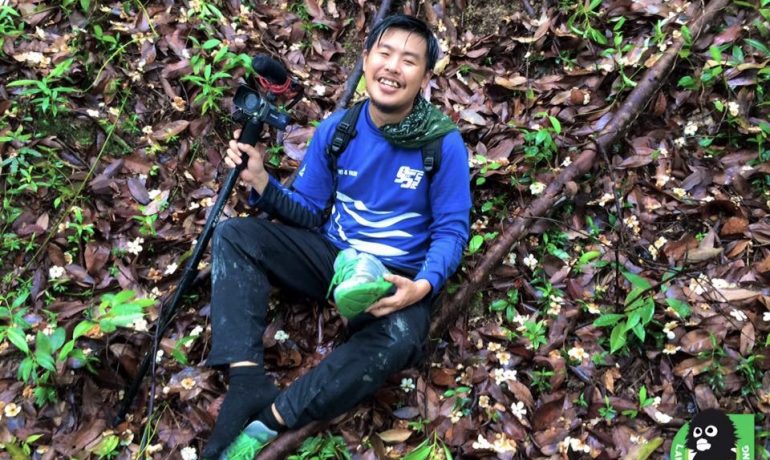Award-winning filmmaker Andrew Han has been documenting human rights and environmental issues facing Penang and Malaysia since 2009. What is keeping him going for 13 years and counting?
By Lee Kwai Han
“Do you want me to hold your camera?” Rexy Prakash Chacko from Penang Hills Watch asked Andrew Han as the group of four climbed up a narrow steep slope one after another. They were aiming for the upstream of Sungai Kechil in Tanjung Bungah. Hiking the unbeaten routes in Penang’s hills with a video camera in hand posed a challenge for Han. Yet he was determined to film the group’s expedition for the making of a river awareness-raising video.
That was July 2019, two years after Han released his award-winning documentary, The Hills and The Sea. Ever since he got his first camcorder in 2009, Han has not stopped documenting what he comes across. His videos cover a wide range of topics, such as human rights and environmental issues, in different video formats, e.g. documentaries and critiques.
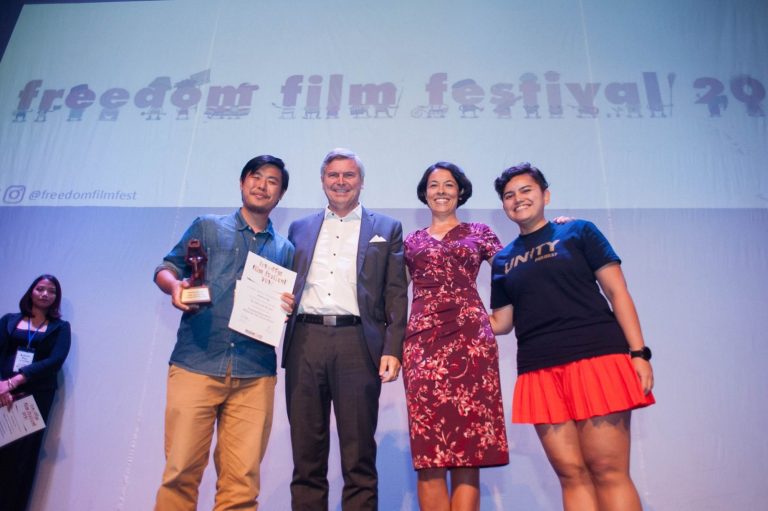
Han received the Justin Louis Award 2017 for The Hills and The Sea.
Protests can be beautiful
“My literature studies background has helped me see things critically,” says Han, who graduated from Universiti Kebangsaan Malaysia (UKM) with a master’s degree in Postcolonial Literature in English. Despite this, he finds himself more interested in the visual presentation of issues.
During his studies at UKM, he assisted in a research project on independent filmmakers in Malaysia. For the project, he attended independent film screenings and met indie filmmakers like Tan Chui Mui and James Lee. He was fascinated to see how independent films spark discussions and stimulate critical thinking about issues in their surroundings.
After graduation, he started spending his after-work hours making his own videos. The video on Western Road Cemetery in Penang was his first documentary attempt.
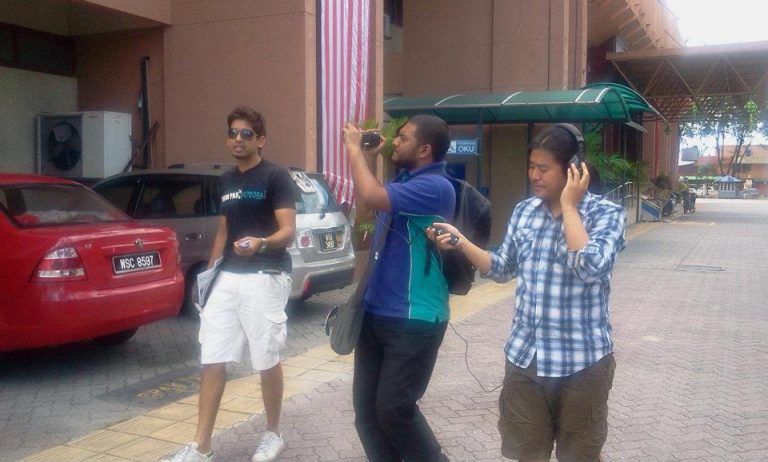
Han doing sound recording for a vox pop in Petaling Jaya.
Later, he documented the #OccupyDataran movement, where people gathered and discussed problems and solutions at Dataran Merdeka every Saturday night. In 2013, he followed Reclaim Merdeka Park, another grassroots movement to protest against the public park, Taman Merdeka, being demolished for development. He visited the site weekly to document the movement as well as happenings around the site.
As a videographer, he found himself learning so much about his surroundings from the people he met, and through the stories they shared. There, he witnessed firsthand how people’s connection with their living place was severed with a top-down change to public space.
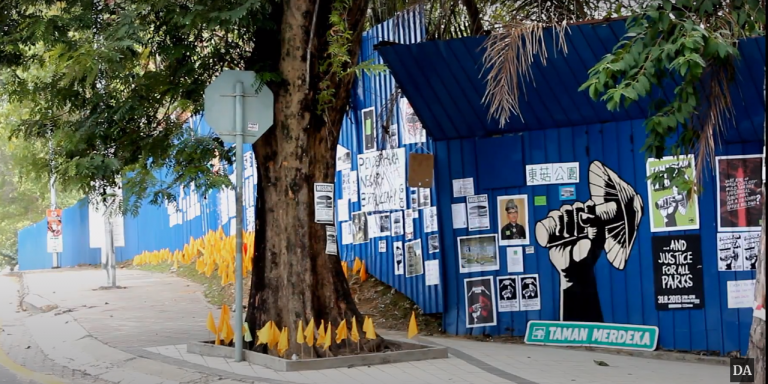
Part of the Reclaim Merdeka Park movement as Han documented it.
Recalling his deep interest in the Reclaim Merdeka Park movement, he was indeed fascinated by how visually attractive and engaging the protests were. “The artists’ group did very beautiful protests,” Han says.
Nine years have passed. The Merdeka Park is gone—to be replaced by the soon-to-be world’s second tallest building, Menara Merdeka 118—yet a beautiful protest remains in the memories of many, as well as in Han’s video.
Feeling the pain of bearing witness to conflicts
In 2016, Han returned to Penang. He set out to defend what he loves with his film-making skills.
Andrew started to document issues facing Penang, such as public transportation issues, hill development, and sea reclamation. However, this constantly brings him to the frontline of witnessing persistent conflicts between humans as well as between humans and wildlife.
Feeling helpless sometimes, Han asks himself, “Are my films making a difference?”
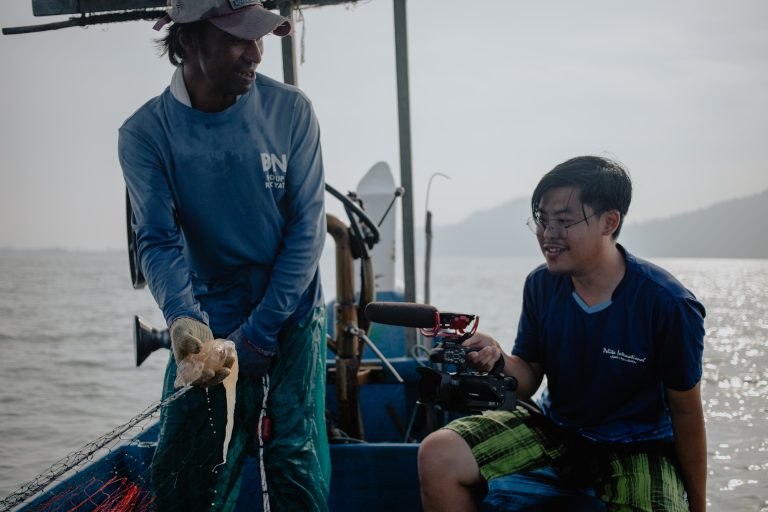
Documenting fisherman at work for Doa Seorang Nelayan (2019).
Helplessness has been a great challenge for Han. He is thankful that his wife has always been his comrade and supporter, encouraging him to continue standing firm for what he cares about.
Staying On
Han remembers most vividly the scene he filmed in a mosque for Doa Seorang Nelayan. As his camera rolled, Zakaria Ismail, the film’s protagonist, prayed desperately in the face of the Penang South Reclamation issue. The emotional plea for help left a great impact on Han.
Looking back at Han’s videos and films in the past 13 years, aren’t those his prayers too?
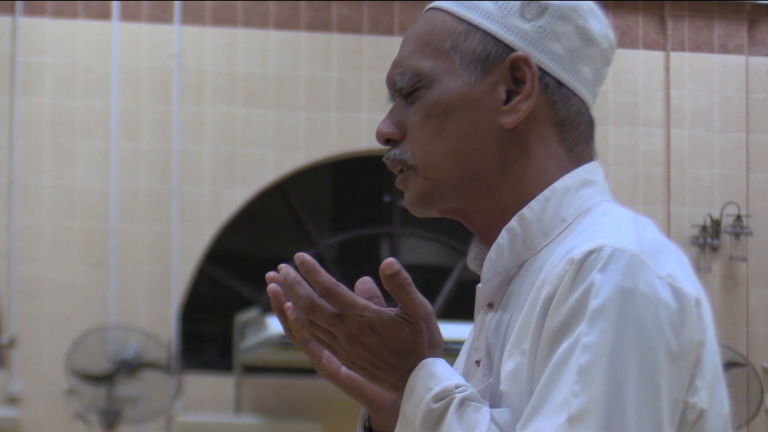
Doa Seorang Nelayan made its debut in 2019. Han released a Hokkien version in 2021 as his first attempt at producing work in Hokkien.
Han sees his film-making as a way to express himself, connect with people, and encourage dialogues about ourselves and our surroundings. His care for his homeland and people has empowered him towards more attempts and exploration, in addition to working alongside members of Penang Forum and Jaringan Ekologi dan Iklim (JEDI).
In September this year, he will release an experimental piece titled Buwanaku (“My World” in the Malay Language). “There will be no words and no narration. Just Penang island through my eyes,” he shares excitedly.
Han is poised to push the envelope of his visual narrative again.
All images courtesy of Andrew Han.
Lee Kwai Han manages arts and environmental education projects in Penang. Despite her training in engineering, she believes arts is the software solution our society needs.

